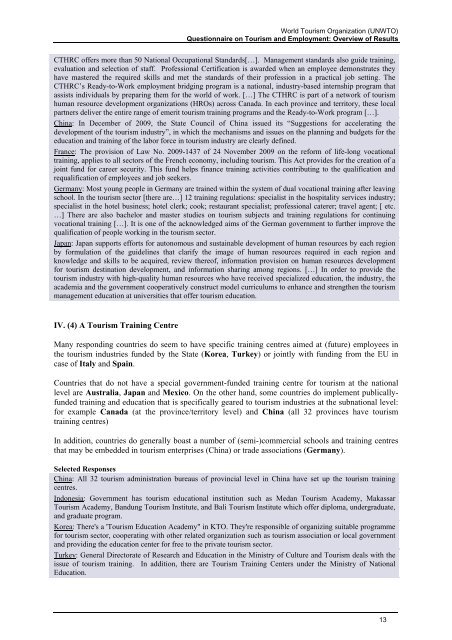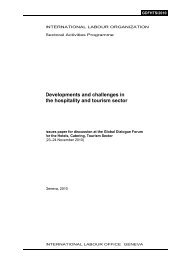Questionnaire on Tourism and Employment: Overview of Results
Questionnaire on Tourism and Employment: Overview of Results
Questionnaire on Tourism and Employment: Overview of Results
You also want an ePaper? Increase the reach of your titles
YUMPU automatically turns print PDFs into web optimized ePapers that Google loves.
World <strong>Tourism</strong> Organizati<strong>on</strong> (UNWTO)<br />
<str<strong>on</strong>g>Questi<strong>on</strong>naire</str<strong>on</strong>g> <strong>on</strong> <strong>Tourism</strong> <strong>and</strong> <strong>Employment</strong>: <strong>Overview</strong> <strong>of</strong> <strong>Results</strong><br />
CTHRC <strong>of</strong>fers more than 50 Nati<strong>on</strong>al Occupati<strong>on</strong>al St<strong>and</strong>ards[…]. Management st<strong>and</strong>ards also guide training,<br />
evaluati<strong>on</strong> <strong>and</strong> selecti<strong>on</strong> <strong>of</strong> staff. Pr<strong>of</strong>essi<strong>on</strong>al Certificati<strong>on</strong> is awarded when an employee dem<strong>on</strong>strates they<br />
have mastered the required skills <strong>and</strong> met the st<strong>and</strong>ards <strong>of</strong> their pr<strong>of</strong>essi<strong>on</strong> in a practical job setting. The<br />
CTHRC’s Ready-to-Work employment bridging program is a nati<strong>on</strong>al, industry-based internship program that<br />
assists individuals by preparing them for the world <strong>of</strong> work. […] The CTHRC is part <strong>of</strong> a network <strong>of</strong> tourism<br />
human resource development organizati<strong>on</strong>s (HROs) across Canada. In each province <strong>and</strong> territory, these local<br />
partners deliver the entire range <strong>of</strong> emerit tourism training programs <strong>and</strong> the Ready-to-Work program […].<br />
China: In December <strong>of</strong> 2009, the State Council <strong>of</strong> China issued its “Suggesti<strong>on</strong>s for accelerating the<br />
development <strong>of</strong> the tourism industry”, in which the mechanisms <strong>and</strong> issues <strong>on</strong> the planning <strong>and</strong> budgets for the<br />
educati<strong>on</strong> <strong>and</strong> training <strong>of</strong> the labor force in tourism industry are clearly defined.<br />
France: The provisi<strong>on</strong> <strong>of</strong> Law No. 2009-1437 <strong>of</strong> 24 November 2009 <strong>on</strong> the reform <strong>of</strong> life-l<strong>on</strong>g vocati<strong>on</strong>al<br />
training, applies to all sectors <strong>of</strong> the French ec<strong>on</strong>omy, including tourism. This Act provides for the creati<strong>on</strong> <strong>of</strong> a<br />
joint fund for career security. This fund helps finance training activities c<strong>on</strong>tributing to the qualificati<strong>on</strong> <strong>and</strong><br />
requalificati<strong>on</strong> <strong>of</strong> employees <strong>and</strong> job seekers.<br />
Germany: Most young people in Germany are trained within the system <strong>of</strong> dual vocati<strong>on</strong>al training after leaving<br />
school. In the tourism sector [there are…] 12 training regulati<strong>on</strong>s: specialist in the hospitality services industry;<br />
specialist in the hotel business; hotel clerk; cook; restaurant specialist; pr<strong>of</strong>essi<strong>on</strong>al caterer; travel agent; [ etc.<br />
…] There are also bachelor <strong>and</strong> master studies <strong>on</strong> tourism subjects <strong>and</strong> training regulati<strong>on</strong>s for c<strong>on</strong>tinuing<br />
vocati<strong>on</strong>al training […]. It is <strong>on</strong>e <strong>of</strong> the acknowledged aims <strong>of</strong> the German government to further improve the<br />
qualificati<strong>on</strong> <strong>of</strong> people working in the tourism sector.<br />
Japan: Japan supports efforts for aut<strong>on</strong>omous <strong>and</strong> sustainable development <strong>of</strong> human resources by each regi<strong>on</strong><br />
by formulati<strong>on</strong> <strong>of</strong> the guidelines that clarify the image <strong>of</strong> human resources required in each regi<strong>on</strong> <strong>and</strong><br />
knowledge <strong>and</strong> skills to be acquired, review there<strong>of</strong>, informati<strong>on</strong> provisi<strong>on</strong> <strong>on</strong> human resources development<br />
for tourism destinati<strong>on</strong> development, <strong>and</strong> informati<strong>on</strong> sharing am<strong>on</strong>g regi<strong>on</strong>s. […] In order to provide the<br />
tourism industry with high-quality human resources who have received specialized educati<strong>on</strong>, the industry, the<br />
academia <strong>and</strong> the government cooperatively c<strong>on</strong>struct model curriculums to enhance <strong>and</strong> strengthen the tourism<br />
management educati<strong>on</strong> at universities that <strong>of</strong>fer tourism educati<strong>on</strong>.<br />
IV. (4) A <strong>Tourism</strong> Training Centre<br />
Many resp<strong>on</strong>ding countries do seem to have specific training centres aimed at (future) employees in<br />
the tourism industries funded by the State (Korea, Turkey) or jointly with funding from the EU in<br />
case <strong>of</strong> Italy <strong>and</strong> Spain.<br />
Countries that do not have a special government-funded training centre for tourism at the nati<strong>on</strong>al<br />
level are Australia, Japan <strong>and</strong> Mexico. On the other h<strong>and</strong>, some countries do implement publicallyfunded<br />
training <strong>and</strong> educati<strong>on</strong> that is specifically geared to tourism industries at the subnati<strong>on</strong>al level:<br />
for example Canada (at the province/territory level) <strong>and</strong> China (all 32 provinces have tourism<br />
training centres)<br />
In additi<strong>on</strong>, countries do generally boast a number <strong>of</strong> (semi-)commercial schools <strong>and</strong> training centres<br />
that may be embedded in tourism enterprises (China) or trade associati<strong>on</strong>s (Germany).<br />
Selected Resp<strong>on</strong>ses<br />
China: All 32 tourism administrati<strong>on</strong> bureaus <strong>of</strong> provincial level in China have set up the tourism training<br />
centres.<br />
Ind<strong>on</strong>esia: Government has tourism educati<strong>on</strong>al instituti<strong>on</strong> such as Medan <strong>Tourism</strong> Academy, Makassar<br />
<strong>Tourism</strong> Academy, B<strong>and</strong>ung <strong>Tourism</strong> Institute, <strong>and</strong> Bali <strong>Tourism</strong> Institute which <strong>of</strong>fer diploma, undergraduate,<br />
<strong>and</strong> graduate program.<br />
Korea: There's a '<strong>Tourism</strong> Educati<strong>on</strong> Academy" in KTO. They're resp<strong>on</strong>sible <strong>of</strong> organizing suitable programme<br />
for tourism sector, cooperating with other related organizati<strong>on</strong> such as tourism associati<strong>on</strong> or local government<br />
<strong>and</strong> providing the educati<strong>on</strong> center for free to the private tourism sector.<br />
Turkey: General Directorate <strong>of</strong> Research <strong>and</strong> Educati<strong>on</strong> in the Ministry <strong>of</strong> Culture <strong>and</strong> <strong>Tourism</strong> deals with the<br />
issue <strong>of</strong> tourism training. In additi<strong>on</strong>, there are <strong>Tourism</strong> Training Centers under the Ministry <strong>of</strong> Nati<strong>on</strong>al<br />
Educati<strong>on</strong>.<br />
13



